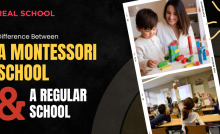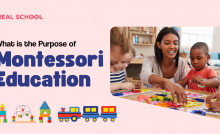From Passion to Profession: The Journey of Montessori Teacher Training


For many educators, the journey of Montessori teacher training is a transformational experience that begins with a deep passion for child-centered education. The decision to embark on this path is fueled by a desire to foster independence, nurture a love for learning, and make a lasting impact on young minds. From passion to profession, Montessori teacher training equips educators with the knowledge, skills, and philosophy needed to become skilled guides and advocates for children’s holistic development. In this article, we will explore the rewarding journey of Montessori teacher training and the steps involved in transforming passion into a lifelong profession.
-
Embracing the Montessori Philosophy
The journey of Montessori teacher training starts with a genuine passion for the Montessori philosophy and principles. Educators drawn to this approach believe in the innate potential of each child and the significance of creating a prepared environment that fosters self-directed learning. They recognize the value of observation and the role of the teacher as a facilitator of growth and discovery.
-
Researching and Selecting a Training Program
Once the passion for Montessori education is ignited, aspiring educators embark on the next step: researching and selecting a suitable Montessori teacher training program. This critical decision involves evaluating factors such as accreditation, curriculum, practical experience, and the expertise of trainers. Aspiring teachers seek programs that align with their values and professional goals.
-
Engaging in Theoretical and Practical Learning
Montessori teacher training programs offer a blend of theoretical and practical learning experiences. Educators delve into the Montessori philosophy, child development principles, and the purpose and use of Montessori materials. Practical training involves hands-on experience in preparing materials, presenting lessons, and observing children in a Montessori classroom.
-
Nurturing Observation Skills
Observation is a cornerstone of Montessori education, enabling educators to understand each child’s needs and interests fully. Aspiring Montessori teachers develop and nurture their observation skills during training, learning to keenly observe children’s work habits, challenges, and progress. Observations inform lesson planning and individualized instruction.
-
Creating a Prepared Environment
A crucial aspect of Montessori teacher training involves learning how to create a prepared environment that supports a child’s natural development. Aspiring educators understand the importance of arranging the classroom with intention, providing a range of materials that cater to various learning needs, and fostering an atmosphere of respect and independence.
-
Practicing the Role of the Guide
Montessori teachers embrace the role of a guide who nurtures a child’s curiosity and independence. During training, educators learn to step back and allow children to make choices and learn at their own pace. The art of guiding involves providing gentle support, fostering problem-solving skills, and encouraging self-confidence.
-
Fostering Emotional Intelligence
Montessori teacher training emphasizes the significance of nurturing emotional intelligence in children. Aspiring educators learn strategies to create a supportive and empathetic classroom culture where children feel safe expressing their feelings and building positive relationships with peers and teachers.
-
Reflecting on Personal Growth
The journey of Montessori teacher training involves personal growth and reflection. Aspiring educators examine their teaching philosophy, values, and communication styles. The process of self-discovery helps educators refine their approach and build authentic connections with their students.
-
Becoming a Certified Montessori Educator
Upon completing the required training hours and practical experience, educators may become certified Montessori teachers. Certification may be granted by reputable Montessori organizations such as AMI (Association Montessori Internationale) or AMS (American Montessori Society). Certification is a milestone that validates the educator’s commitment to the Montessori philosophy and their readiness to make a difference in children’s lives.
-
Embracing a Lifelong Profession
The journey of Montessori teacher training is not merely a destination but the beginning of a lifelong profession. Certified Montessori educators continue to engage in ongoing professional development, attending workshops, conferences, and networking with fellow educators. They stay current with educational research and continuously refine their teaching practices to unleash the full potential of Montessori education.
Conclusion
From passion to profession, the journey of Montessori teacher training is a profound and transformative experience for educators who seek to make a positive impact on the lives of children. Through embracing the Montessori philosophy, engaging in hands-on learning experiences, and becoming skilled guides who foster independence and self-directed learning, educators unleash the power of Montessori education. This journey is marked by continuous growth, reflection, and dedication to creating nurturing environments that empower children to become confident, curious, and lifelong learners. As Montessori-trained educators embark on their profession, they embody the essence of their passion and contribute to building a brighter future for generations to come.
FAQs (Frequently Asked Questions)
What are the different levels of Montessori teacher training available for educators?
How does Montessori teacher training accommodate educators with diverse teaching backgrounds?
Can Montessori principles be integrated into traditional educational settings?
Recent Posts
What are the Advantages of Online Teaching at The Real School?
In the article -"What are the Advantages of Online Teaching at The Real School?" we…
What is the Full Form of School?: Unveiling the Acronym
The term "school" carries profound significance in the realm of education, representing more than just…
What is Math Full Form?: Cracking the Code
Mathematics, often referred to as "Math," is a subject that elicits various reactions from students…
What is Full Form of Homework?: Decoding Academics
Homework, an integral part of the academic journey, often raises questions about its purpose and…
What is Full Form of Teacher?: Demystifying Education
In the intricate tapestry of education, teachers stand as the pillars shaping the intellectual and…
What is Real Education?: Discovering Its Essence and Impact
The concept of real education is evolving, transcending traditional views that equate it solely with…


